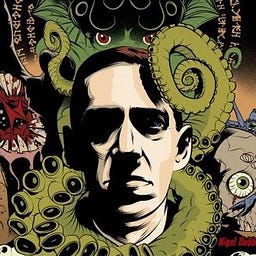The American Civic Religion: Toward a Functionalist Understanding of Religion, Pt. 2
Description
This is episode 5, Toward a Functionalist Understanding of Religion, Pt. 2
This is a continuation of my previous episode, and the analysis I am about to present will make a lot less sense if you haven’t heard that one.
Part 1 - intro and genealogy
Recap
My purpose in this series is to explain how I think about religion using a functionalist framework.
To be successful in this analysis, we must approach the topic from the outside, with as much impartiality as possible
I have identified six components of religious belief:
Gnosis - the life-changing hidden knowledge
Nemesis - the enemy who wants to hide it from you
Ecstasy - the transcendent mental states that are given to the elect
Taboo - the forbidden actions which those with gnosis understand to avoid
Eschatology - a model of how the world will end
Telos - a prescription for how to spend your surpluses beyond the necessities of survival
My functional taxonomy is not the gospel truth. It is a model, and all models are wrong, but some are useful.
The power to understand the distinction — understand it in your heart — has not been granted to everyone. And there are many who, no matter how you explain it to them, they cannot grasp it
It’s like trying to explain to a human being how to fly by flapping his arms. He doesn’t have the hardware to soar
What I have tried to model for you, in part 1, is what you might call our metaphysical needs. We think of physical needs or psychological needs, and most people are familiar with that moral abomination called Maslow’s Hierarchy of Needs.
And we have also heard, mostly from religious people admittedly, that men possess a yearning for god, they say there is a god shaped hole in man’s heart.
But rarely have I seen anyone interrogate the shape of the cardiovascular chasm, as if to learn something about the shape of the deity thereby
I have observed purely on my own, by making a study of myself and the people around me, what yearnings, or longings, men are trying to satisfy when they search for religion
In the Screwtape Letters, C.S. Lewis describes a man who is kept from all manner of devilry and vice by his mundane enthusiasm for liver and onions
Lewis believed that everything good and wholesome flowed from the Christian God, no matter how trivial. So for him there is an inexorable wholesomeness to simple earthly pleasures which could very well stave away sinful temptations.
And I invoke this story because I think it illustrates how our metaphysical needs don’t have to be complex or profound.
But in everyone you meet, if you get to know them, you can begin to divine their personal religion, their gnosis, their eschatology, their taboos and so on.
And sometimes those things bear a family resemblance to the official gnosis and eschatology and etc of a church, or one of the big-name religions
But what we increasingly find, when we dig into other people’s values, is that they don’t align to any of the classic religions, and yet they are mostly of a kind.
That is, my neighbor and your neighbor, if we try to elucidate their gnosis, their eschatology, and so on, these things can be clearly articulated,
but they aren’t Christian or Buddhist or Hindu or Islamic or anything else.
It’s an Evolian insight, I think, that anyone who is aware of a tradition as something of which you can be inside or outside is by definition outside
That a living tradition doesn’t conceive of itself as a tradition, only a zombie tradition does that, a dead man walking
Bronze Age Pervert has noted that even among obscure tribesmen living in South America or Africa, they may cleave to their ancient ways, but there is still something deliberate or artificial about it
They have lost the innocence of tradition because the act of reflection, of seeing our modern ways and choosing to reject them, causes a kind of discontinuity. They know something their ancestors did not know, and could not have known.
And the same thing may be true, more or less, of religion, which is a kind of tradition
Notice that there are no real theological debates within Christianity any more, there are only ancient historical debates, heresies and orthodoxies, schools of thought in well-worn channels that have long since petrified
But in this other thing I’m talking about, this thing which seems to furnish the spiritual life of most Americans, of most of the people we meet around us
It does have active theological debates, such as “who is more oppressed by heteropatriarchal society: a transwoman or a black amputee?” This is a real question that pious Americans wrestle with.
American Civic Religion
I don’t expect that many of you who are listening need to be led to this conclusion: the religion we are talking about, the one that furnishes these metaphysical anchors, is the American civi






